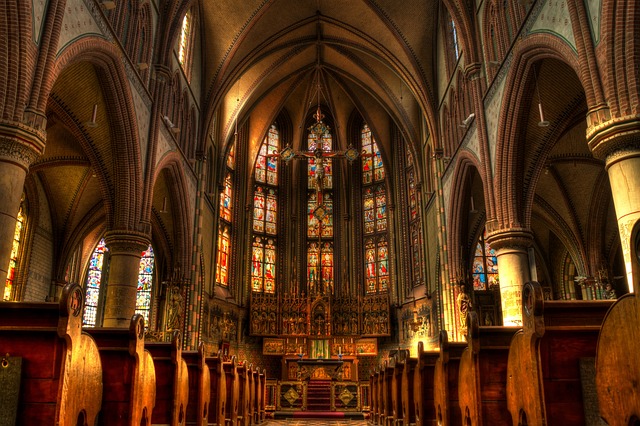No, Catholics are not typically considered Pentecostal.
Table of Contents
The Similarities and Differences Between Catholicism and Pentecostalism
Are Catholics Pentecostal?
When it comes to religion, there are countless denominations and belief systems that people adhere to. Two of the most well-known and widely practiced are Catholicism and Pentecostalism. While they both fall under the umbrella of Christianity, there are distinct differences between the two. In this article, we will explore the similarities and differences between Catholicism and Pentecostalism, shedding light on whether Catholics can be considered Pentecostal.
First and foremost, it is important to understand the basic tenets of each belief system. Catholicism is a traditional form of Christianity that traces its roots back to the time of Jesus Christ. It is characterized by a hierarchical structure, with the Pope serving as the head of the Church. The Catholic Church places great emphasis on sacraments, rituals, and traditions, and holds the belief in the real presence of Christ in the Eucharist.
On the other hand, Pentecostalism is a more recent movement within Christianity that emerged in the early 20th century. It is known for its emphasis on the Holy Spirit and the belief in the gifts of the Spirit, such as speaking in tongues, prophecy, and healing. Pentecostals place great importance on personal experiences of faith and the direct interaction with the Holy Spirit.
Despite these differences, there are some similarities between Catholicism and Pentecostalism. Both believe in the Holy Trinity – God the Father, God the Son (Jesus Christ), and God the Holy Spirit. Both also hold the Bible as a sacred text and believe in the divinity of Jesus Christ. Additionally, both Catholicism and Pentecostalism emphasize the importance of prayer and worship.
However, the differences between the two are significant. One of the key distinctions lies in the structure and organization of the Church. Catholicism has a highly centralized structure, with the Pope as the ultimate authority. Pentecostalism, on the other hand, is characterized by a more decentralized structure, with individual churches and pastors having more autonomy.
Another major difference is the role of sacraments. Catholicism places great importance on the seven sacraments, which are seen as channels of God’s grace. Pentecostalism, on the other hand, does not have a formal sacramental system. Instead, it focuses on the direct experience of the Holy Spirit and the gifts that come with it.
Furthermore, the worship styles in Catholicism and Pentecostalism differ greatly. Catholic worship is often characterized by its formal rituals, liturgy, and reverence. Pentecostal worship, on the other hand, is known for its energetic and spontaneous nature, with a strong emphasis on music and praise.
So, can Catholics be considered Pentecostal? While there may be some individuals who identify as both Catholic and Pentecostal, it is important to recognize that the two belief systems have distinct differences. Catholicism is deeply rooted in tradition, sacraments, and hierarchy, while Pentecostalism is characterized by its emphasis on personal experiences of faith and the gifts of the Holy Spirit.
In conclusion, while there are some similarities between Catholicism and Pentecostalism, they are ultimately different belief systems within Christianity. Catholics can certainly appreciate and learn from the emphasis on the Holy Spirit in Pentecostalism, but it would be inaccurate to label them as Pentecostal. Ultimately, the choice of denomination and belief system is a personal one, and individuals should follow the path that resonates most with their own faith journey.
Understanding the Role of the Holy Spirit in Catholic and Pentecostal Beliefs

Are Catholics Pentecostal?
When it comes to understanding the role of the Holy Spirit in Catholic and Pentecostal beliefs, it’s important to recognize that while there are some similarities, there are also significant differences. Both Catholicism and Pentecostalism are Christian denominations that place a strong emphasis on the Holy Spirit, but they approach this aspect of faith in distinct ways.
In Catholicism, the Holy Spirit is seen as one of the three persons of the Holy Trinity, along with God the Father and Jesus Christ the Son. Catholics believe that the Holy Spirit is present and active in the Church, guiding and empowering believers. The Holy Spirit is seen as the source of grace, helping individuals to grow in holiness and leading the Church as a whole. Catholics believe that the Holy Spirit is received through the sacraments, particularly through the sacraments of baptism and confirmation.
Pentecostalism, on the other hand, is a movement within Christianity that places a special emphasis on the gifts of the Holy Spirit, particularly the gift of speaking in tongues. Pentecostals believe that the Holy Spirit is not only present in the Church but also actively working in the lives of believers. They believe in the baptism of the Holy Spirit, which is often accompanied by speaking in tongues and other spiritual gifts. Pentecostals see these gifts as evidence of the Holy Spirit’s presence and power.
While both Catholics and Pentecostals believe in the Holy Spirit and recognize the importance of His role in the life of the Church, there are some key differences in their beliefs and practices. One of the main differences is the emphasis on speaking in tongues. While some Catholics may experience the gift of tongues, it is not as central to their faith as it is in Pentecostalism. Catholics place a greater emphasis on the sacraments and the role of the Church hierarchy in mediating the presence of the Holy Spirit.
Another difference is the way in which the Holy Spirit is understood in relation to the other persons of the Trinity. Catholics believe in the doctrine of the Trinity, which teaches that the Father, Son, and Holy Spirit are distinct persons but one God. Pentecostals, on the other hand, may have a more experiential understanding of the Holy Spirit, often focusing on personal encounters and manifestations of His presence.
It’s important to note that these differences do not mean that one group is right and the other is wrong. Both Catholicism and Pentecostalism have rich traditions and deep spiritual insights. They simply approach the role of the Holy Spirit in slightly different ways.
In conclusion, while Catholics and Pentecostals both believe in the Holy Spirit and recognize His importance in the life of the Church, there are differences in their beliefs and practices. Catholics place a greater emphasis on the sacraments and the role of the Church hierarchy, while Pentecostals focus more on the gifts of the Holy Spirit, particularly speaking in tongues. Understanding these differences can help foster dialogue and mutual respect between these two Christian traditions.
Exploring the Historical Relationship Between Catholics and Pentecostals
Are Catholics Pentecostal?
When it comes to religious denominations, there are often misconceptions and misunderstandings. One such misconception is the belief that Catholics and Pentecostals are one and the same. While both groups are Christian, they have distinct differences in their beliefs and practices. In this article, we will explore the historical relationship between Catholics and Pentecostals to shed light on this topic.
To understand the relationship between Catholics and Pentecostals, it is important to delve into the origins of both denominations. Catholicism traces its roots back to the time of Jesus Christ and the establishment of the early Christian Church. Pentecostalism, on the other hand, emerged in the late 19th and early 20th centuries as a result of the Pentecostal revival movement.
The Catholic Church is known for its rich history, traditions, and hierarchical structure. It places a strong emphasis on the sacraments, particularly the Eucharist, and the authority of the Pope. Pentecostalism, on the other hand, is characterized by its emphasis on the Holy Spirit and the belief in the gifts of the Spirit, such as speaking in tongues and divine healing.
While there are some similarities between the two denominations, such as their belief in the Holy Trinity and the divinity of Jesus Christ, there are also significant differences. One of the key differences lies in the way worship is conducted. Catholic worship is highly structured and follows a set liturgy, while Pentecostal worship is often characterized by its spontaneity and emotional expression.
Another difference between Catholics and Pentecostals is their approach to religious authority. In Catholicism, the Pope is considered the highest authority and has the power to make infallible statements on matters of faith and morals. Pentecostals, on the other hand, place a greater emphasis on individual interpretation of the Bible and the guidance of the Holy Spirit.
Historically, Catholics and Pentecostals have had a complex relationship. In the early 20th century, Pentecostalism was seen by many Catholics as a threat to the established order. The Catholic Church viewed the Pentecostal movement with suspicion and even condemned some of its practices, such as speaking in tongues.
However, over time, attitudes towards Pentecostalism within the Catholic Church have softened. In recent decades, there has been a growing recognition of the importance of the Holy Spirit and the gifts of the Spirit within Catholic theology. This has led to a greater openness towards charismatic renewal and the incorporation of Pentecostal elements into Catholic worship.
Today, there are even Catholic charismatic communities that embrace the gifts of the Spirit and incorporate charismatic worship practices into their liturgy. These communities, often referred to as “Catholic Pentecostals,” seek to combine the rich traditions of Catholicism with the vibrant spirituality of Pentecostalism.
In conclusion, while Catholics and Pentecostals are both Christian denominations, they have distinct differences in their beliefs and practices. While Catholicism is known for its rich history and hierarchical structure, Pentecostalism emphasizes the Holy Spirit and the gifts of the Spirit. Despite their differences, there has been a growing recognition and acceptance of Pentecostalism within the Catholic Church in recent years. This has led to the emergence of Catholic charismatic communities that seek to combine the best of both traditions. So, are Catholics Pentecostal? The answer is no, but there is a growing appreciation for the spiritual gifts and practices associated with Pentecostalism within the Catholic Church.
Debunking Common Misconceptions About Catholicism and Pentecostalism
Are Catholics Pentecostal?
When it comes to religion, there are often misconceptions and misunderstandings that can lead to confusion. One common misconception is that Catholics are Pentecostal. While both Catholicism and Pentecostalism are branches of Christianity, they have distinct beliefs and practices that set them apart.
To understand the differences between Catholics and Pentecostals, it’s important to first understand the basic tenets of each faith. Catholicism is the oldest form of Christianity, tracing its roots back to the time of Jesus Christ and the apostles. It is a hierarchical religion, with the Pope as the head of the Church and bishops overseeing local dioceses. Catholics believe in the Holy Trinity, the divinity of Jesus Christ, and the importance of sacraments such as baptism and the Eucharist.
On the other hand, Pentecostalism is a relatively newer movement within Christianity that emerged in the early 20th century. Pentecostals emphasize the direct experience of the Holy Spirit and believe in the practice of speaking in tongues, or glossolalia. They place a strong emphasis on personal conversion and the power of the Holy Spirit to heal and perform miracles.
While there are some similarities between Catholics and Pentecostals, such as their belief in Jesus Christ as the Son of God, there are also significant differences. One major difference is the role of the Holy Spirit in each faith. While Catholics believe in the Holy Spirit and its presence in the Church, they do not place as much emphasis on the direct experience of the Holy Spirit as Pentecostals do.
Another difference is the practice of speaking in tongues. While some Catholics may engage in charismatic worship and experience the gift of tongues, it is not a central practice or belief within Catholicism as it is in Pentecostalism. Catholics place a greater emphasis on the sacraments and the liturgy as a means of encountering God.
It’s also important to note that Catholicism is a global religion with a rich history and diverse cultural expressions. There are Catholics from all walks of life, from traditionalists who adhere strictly to the teachings of the Church to more progressive Catholics who may have different interpretations of certain doctrines. Pentecostalism, on the other hand, is a more recent movement that has gained popularity in certain parts of the world, particularly in the United States and Latin America.
In conclusion, while both Catholics and Pentecostals are branches of Christianity, they have distinct beliefs and practices that set them apart. Catholics are not Pentecostal, although there may be some Catholics who engage in charismatic worship and experience the gift of tongues. Understanding these differences can help dispel misconceptions and foster greater understanding and respect between different religious traditions.
Conclusion
No, Catholics are not typically considered Pentecostal.
For licensing reasons, we must provide the following notice: This content was created in part with the help of an AI.


